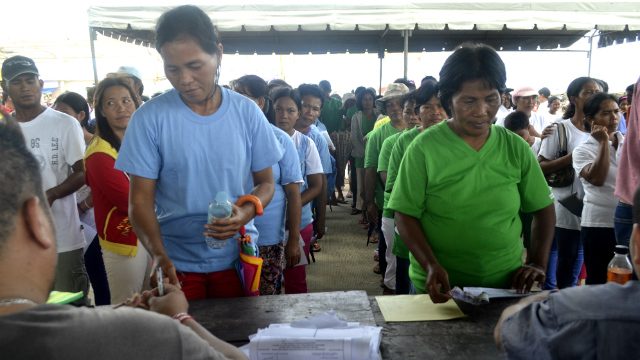SUMMARY
This is AI generated summarization, which may have errors. For context, always refer to the full article.

MANILA, Philippines – Department of Social Welfare and Development (DSWD) Secretary Dinky Soliman said on Wednesday, October 29, that the recent Social Weather Stations (SWS) survey results on poverty do not mean their programs are not working.
“Hindi pang mabilisan ang pagsagot sa kahirapan at pagkagutom,” Soliman said. (Responding to poverty and hunger isn’t achieved immediately.)
Poll results showed that an estimated 12.1 million families in the Philippines consider themselves poor, while 9.3 million families said they are food-poor during the 3rd quarter of 2014. (READ: More Filipino families consider themselves poor – survey)
The Secretary also said that without their programs, the survey “may have yielded more detrimental results.”
CCT is not alone
Soliman emphasized that even if the DSWD-headed Conditional Cash Transfer (CCT) program contributes to poverty alleviation, it is not the only solution.
Under the program, indigent families receive a monthly stipend of up to P1,400 ($31)* for their household needs and children’s education for so long as they adhere to the guidelines set by the department. The program has been criticized in and outside the government since it started. (READ: Lawmakers question DSWD’s conditional cash transfer program)
On Monday, October 27, Malacañang said that CCT will now cover street families – ambulant families with no permanent residence. (READ: Conditional cash transfer program to cover street families
The full impact of the CCT, also called Pantawid Pamilyang Pilipino Program (4Ps), the Secretary stressed, is long-term and focuses on ending the inter-generational cycle of poverty among families.
“The investment in the children’s education would only be fully felt 10 years from since the program started, when the children have graduated and have been gainfully employed,” she said. “They will be the ones to help their family get out of poverty.”
The DSWD claims there are at least 4 million 4Ps households nationwide as of October 2014.
According to Soliman, the 2nd wave of the Impact Evaluation for Pantawid Pamilya yielded positive results. The main findings of the study show improvements in the health and food consumption conditions of household beneficiaries.
Intensify programs
According to the DSWD, they are currently coordinating with various government agencies in their programs against hunger and poverty. The lead agency will also look into working with Senator Grace Poe on chanelling more funds to social protection services. In a recent privilege speech Poe emphasized the need to increase food production and allow children to achieve their full potential.
Presidential Communications Secretary Herminio Coloma Jr previously said that the 2015 National Expenditure Program appropriated the “biggest portion” of the budget to social services, with P967.9 billion ($21.5 billion) allocated, equivalent to about 37.2%.
The results of the SWS survey can be a guide for stakeholders to develop programs for the underprivileged, Soliman said. She added that the agency still vows to improve its various anti-poverty programs.
“It is important then to intensify our programs to ensure that the number will not increase anymore,” she said. – Rappler.com
(Editor’s note: #HungerProject is an ongoing partnership between DSWD, World Food Programme, and Rappler.)
Add a comment
How does this make you feel?
There are no comments yet. Add your comment to start the conversation.